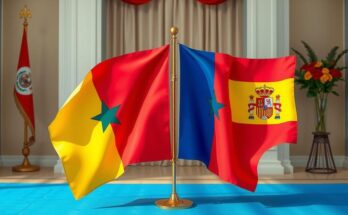Tunisia’s recent presidential elections witnessed a turnout of 27.7% amid public apathy and allegations of an oppressive political climate. Incumbent President Kais Saied faced challengers Ayachi Zammel, imprisoned ahead of the election, and Zouhair Maghzaoui. Many voters expressed disillusionment, while others maintained that participating in the elections was necessary for the country’s future.
On October 6, 2024, Tunisians participated in presidential elections amidst a backdrop of significant political tension and public apathy. The vote featured incumbent President Kais Saied competing against two challengers: Zouhair Maghzaoui, a leftist candidate, and Ayachi Zammel, a businessman currently imprisoned under allegations of forgery related to the election process. Reportedly, the turnout for the election was a dismal 27.7%, with many voters expressing their disillusionment with the electoral process, which they characterized as an authoritarian maneuver. The political climate leading to the election was notably oppressive, as various potential candidates faced arrests and disqualifications, pointing to an increasingly constrained political landscape in Tunisia. Saied, who has been in power since 2021, has enacted measures that significantly expanded his executive powers, including dissolving parliament and modifying the constitution. As such, the atmosphere surrounding the elections largely reflected public disengagement and skepticism about the process’s legitimacy. While significant segments of the opposition boycotted the elections, viewing them as a farce, others encouraged participation as a civic duty. Voters, such as taxi driver Khaled Lamsi, emphasized the importance of voting for the future of Tunisia and voiced hope for positive change. Despite being one of the earliest nations to successfully challenge autocratic rule during the Arab Spring, Tunisia finds itself at a precarious juncture, with many observers predicting that Saied is likely to secure another term given the landscape of fear and repression that has suppressed opposition.
Tunisia, renowned for its pivotal role in the Arab Spring, finds itself grappling with the consequences of political reforms that have led to instability and authoritarianism in recent years. Following the ousting of its long-time president in 2011, Tunisia initially embarked on a journey toward democratic governance. However, political discontent and economic challenges have fostered an environment where President Kais Saied, who assumed office in 2020, has managed to suppress dissent effectively. His presidency has been marked by a series of controversial decisions, including a constitutional overhaul that increased his powers and curtailed parliamentary authority, raising concerns about the state of democracy in Tunisia.
The recent presidential elections in Tunisia highlight the precarious state of its democracy, with an alarmingly low voter turnout reflecting widespread disenchantment among citizens. President Kais Saied’s consolidation of power and the absence of viable opposition candidates come at a time when many Tunisians feel their voices are marginalized. Moving forward, Tunisia’s political future remains uncertain, hinging on the government’s ability to foster inclusivity and restore public confidence in electoral processes.
Original Source: apnews.com




